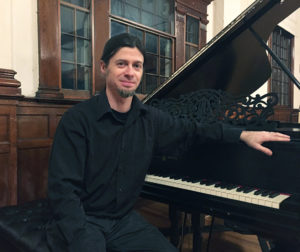Millions of Americans concerned by the election of President Donald Trump marched on January 20, but for many, the question remains of what to do next. Lincoln musician Trevor Berens has a novel idea: offering house concerts for charity.
Berens, a pianist and composer specializing in contemporary/avant-garde classical music, will come to the home of anyone with a well-tuned piano and enough space for at least 15 guests. Rather than pay him a fee, the host would make a donation to a charity that focuses on the environment and climate change, minorities and/or women. The host could collect donations from guests or simply make a single larger donation himself or herself.
Though he’d had the idea for charity house concerts before the election, recent events brought it more into focus. “Like many people, I’ve been trying to figure out things I can actively do to help our situation, and one of the things I felt would be useful for me and probably others was to offer a space in which I could give music,” Berens said.
Berens is particularly interested in helping the National Resources Defense Council, Planned Parenthood and the American Civil Liberties Union, but is open to playing for the benefit of other nonprofit organizations that have similar agendas. The dollar amount to be raised at house concerts is flexible, but he hopes that each concert would reap at least $300.
Berens and his wife, singer and voice teacher Jessica Tunick, moved from their native Los Angeles to the Boston area so he could earn a graduate degree in music therapy from Lesley University (they’ve lived in Lincoln for seven years). He’s now a music therapist and private piano teacher who usually teaches in students’ homes. Both are also active performers; they are members of the Sonic Liberation Players, which is giving its next concert on February 3 at 8 p.m. at the Third Life Studio in Somerville. Musicians from that group may be available to play with Berens at house concerts if the host wants.
Though classically trained, Berens’s repertoire consists of recent music. Some of his favorite modern composers are John Cage, Frederic Rzewski, Morton Feldman and Giacinto Scelsi. “I think modern music engenders more conversation and has the ability to better reflect current times. The classics were written in a time when things were different. It’s important to look at the artists of now and the recent past to better understand where we are,” he said. “I hope the way I present this kind of music isn’t like dropping a foreigner in a new country and leaving them there—I’m hopefully taking them by the hand and leading them there.”
Those interested can see more on Berens’s website or listen to samples of his compositions and other performance pieces on SoundCloud. He and Tunick also have a separate website for their teaching.

